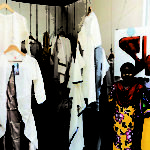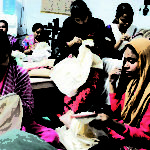Once exploited, these women Chikan Karigars of Lucknow are masters of their designs today.
By Mehru Jaffer
About 11 women in Lucknow are establishing their individual identities as chikankari embroidery artisans “ all thanks to Sangraha, an organization that not only trained them, but also connects them with buyers through an online platform.
Tabassum Khan, 25, and Sheeba Khan, 26, had wanted to apply for a bank loan once. Under the cover of their full-length black burqa, the two made their way to the branch of the nearest bank, criss-crossing through many narrow lanes in Lucknow’s congested Madegunj Khadra neighbourhood. Encouraged by the recent sale of their embroidered clothes, the two were excited about the possibility of expanding their work and perhaps even striking out on their own. “We wanted money to buy more cloth. We dreamt of having our own wooden frames, more needles and more thread,’ recalls Tabassum. However, after spending a few minutes with the bank official, they promptly dropped the idea of applying for the Rs. 50,000 loan. “He wanted us to come home and told us that his wife was interested in learning embroidery. I felt he did not really mean what he was saying. I could see his actual intentions,” says Sheeba. Of course, as they made their way back that day, they would have never imagined that they would eventually be able to realize their dream of becoming artisan-entrepreneurs and selling clothes embellished with exquisite hand-crafted chikankari embroidery.
Today, Tabassum and Sheeba are part of a group of 11 women chikan karigars, who have broken free from the exploitation that is intrinsic to their line of work, to establish their individual identities as artisans.
How did they manage to accomplish this seemingly unimaginable feat? Ask Tabassum and she immediately attributes this positive change to Jaspal Kalra, a professor of fashion design, who set up Sangraha, an organisation that not only conducts a ten-month training programme in design for chikankari artisans, but also connects them with prospective buyers through an online platform, apart from encouraging them to participate in design exhibitions across the country. Essentially, Kalra is a teacher and facilitator, while the women take their own decisions regarding the kind of orders they want to take on. They even have a certain freedom to create their own designs, keeping in mind the clients’ needs. For women like Tabassum and Sheena, who would otherwise never get to experience this kind of autonomy in their personal or professional lives, this partnership has indeed been liberating.
Kalra set up Sangraha in 2015 with an idea to preserve the craft and help artisans gain sustainability and independence. With a mission to empower them with education, market-related services and finance, it started off by providing design education to 11 artisans and encouraging them to participate in various exhibitions in Lucknow and elsewhere, in Delhi, Pune and Jaipur.
(Extracted from www.thebetterindia.com)



COMMENTS